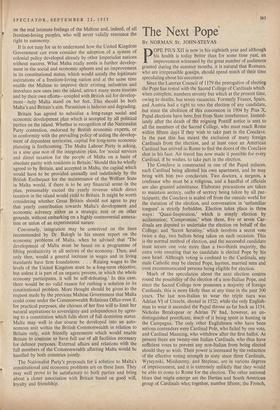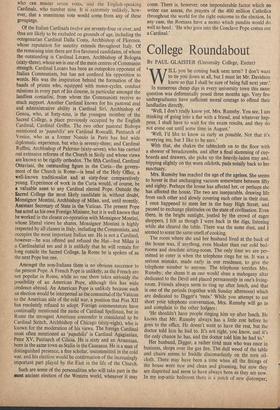The Next Pope ' BY NORMAN ST. JOHN-STEVAS p OPE PIUS XII
is now in his eightieth year and although his health is today better than for some time past, an improvement witnessed by the great number of audiences granted during the summer months, it is natural that Romans, who are irrepressible gossips, should spend much of their time speculating about his successor.
Since the Lateran Council of 1179 the prerogative of electing the Pope has rested with the Sacred College of Cardinals which when complete, numbers seventy but which at the present time, owing to deaths, has seven vacancies. Formerly France, Spain, and Austria had a right to veto the election of any candidate, but since the abolition of this concession in 1904 by Pius X, Papal elections have beenfree from State interference. Immed- iately after the death of the reigning Pontiff notice is sent to all the members of the Sacred College, who must reach Rome within fifteen days if they wish to take part in the Conclave. In the past this has meant the exclusion of many foreign Cardinals from the election, and at least once an American Cardinal has arrived in Rome to find the doors of the Conclave shut in his face. Air travel has now made it possible for every Cardinal, if he wishes, to take part in the election.
The Conclave is constructed in one of the Papal palaces, each Cardinal being allotted his own apartment, and he may bring with him two conclavists. Two doctors, a surgeon, a confessor who must be a religious, and a handful of officials are also granted admittance. Elaborate precautions are taken to maintain secrecy, oaths of secrecy being taken by all par- ticipants; the Conclave is sealed off from the outside world for the duration of the election, and conversation in 'unfamiliar tongues' is strictly forbidden. Election takes place in three ways : 'Quasi-Inspiration,' which is simply election by acclamation; 'Compromise,' when three, five or seven Car- dinals are deputed to undertake the election on behalf of the College; and 'Secret Scrutiny,' which involves a secret vote twice a day, two ballots being taken on each occasion. This is the normal method of election, and the successful candidate , must secure one vote more than a two-thirds majority, the extra vote ensuring that no candidate is elected Pope by his own hand. Although voting is confined to the Cardinals, any male Catholic may be elected Pope, laymen, married men and even excommunicated persons being eligible for election.
Much of the speculation about the next election centres round the possibility of the election of a non-Italian Pope, and since the Sacred College now possesses a majority of foreign Cardinals, this is more likely than at any time in the past 300 years. The last non-Italian to wear the triple tiara was Adrian VI of Utrecht. elected in 1522; while the only English- man to wear it ascended the Papal throne as far back as 1154. Nicholas Breakspear or Adrian IV had, however, an un- distinguished pontificate, much of it being spent in hunting in the Campagna. The only other Englishmen who have been serious contenders were Cardinal Pole, who failed by one vote, and Cardinal Manning, who withdrew after the first ballot. At present there are twenty-one Italian Cardinals, who thus have sufficient votes to prevent any non-Italian from being elected should they so wish. Their power is increased by the reduction of the effective voting strength to sixty since three Cardinals, Wyszynski, Mindszenty, and Stepinac, are in various degrees of imprisonment, and it is extremely unlikely that they would be able to come to Rome for the election. The other national 'blocs that might emerge are the Iberian and South American group of Cardinals who, together, number fifteen; the French, who can muster seven votes, and the English-speaking Cardinals, who number nine. It is extremely unlikely, how- ever, that a unanimous vote would come from any of these groupings.
Of the Italian Cardinals twelve are seventy-four or over, and thus are likely to be excluded on grounds of age, including the octogenarian Cardinal Dalla Costa, Archbishop of Florence. whose reputation for sanctity extends throughout Italy. Of the remaining nine there, are five favoured candidates, of whom the outstanding is Cardinal Lecaro, Archbishop of Bologna (sixty-three), whose see is one of the main centres of Communist strength. Cardinal Lecaro has been an outspoken opponent of Italian Communism, but has not confined his opposition to words. His was the inspiration behind the formation of the bands of priests who, equipped with motor-cycles, conduct missions in every part of his diocese, in particular amongst the landless contadini, from whom the Communists receive so much support. Another Cardinal known for his pastoral zeal and administrative ability is Cardinal Siri, Archbishop of Genoa, who, at forty-nine, is the youngest member of the Sacred College, a place previously occupied by the English Cardinal, Cardinal Griffin. The two other pastoral Bishops mentioned as `papabilis' are Cardinal Roncalli, Patriarch of Venice, who as a former Nuncio in Paris has had wide diplomatic experience, but who is seventy-three; and Cardinal Ruffini, Archbishop of Palermo (sixty-seven), who has carried out extensive reforms of the Church in Sicily and whose views are known to be rigidly orthodox. The fifth Cardinal, Cardinal Ottaviani, the outstanding figure in the Curia—the govern- ment of the Church in Rome—is head of the Holy Office, a well-known traditionalist and at sixty-four comparatively young. Experience of work in the Curia would, of course, be a valuable asset to any Cardinal elected Pope. Outside the Sacred College the most likely candidate is, without doubt, Monsignor Montini, Archbishop of Milan, and, until recently, Assistant Secretary of State in the Vatican. The present Pope has acted as his own Foreign Minister, but it is well known that he worked in the closest co-operation with Monsignor Montini, whose liberal views he shares. Monsignor Montini is highly respected by all classes in Italy, including the Communists, and occupies the most important Italian see. He is not a Cardinal, however—he was offered and refused the Hat—but Milan is a Cardinalatial see and it is unlikely that he will remain for long outside the Sacred College. In Rome he is spoken of as the next Pope but one.
Amongst the non-Italians there is no obvious successor to the present Pope. A French Pope is unlikely, as the French are not popular in Rome, while no one there takes seriously the possibility of an American Pope, although this has wide credence abroad. An American Pope is unlikely because such an election would be interpreted as the committal of the Vatican to the American side of the cold war, a position that Pius XII has resolutely refused to adopt. Foreign commentators have continually mentioned the name of Cardinal Spellman, but in Rome the strongest American contender is considered to be Cardinal Stritch, Archbi6op of Chicago (sixty-eight), who is known for the moderation of his views. The foreign Cardinal most often mentioned as `papabilis' is Cardinal Agagianian, Peter XV, Patriarch of Cilicia. He is sixty and an Armenian, born in the same town as Stalin in the Caucasus. He is a man of distinguished presence, a fine scholar, uncommitted in the cold war, and his election would be confirmation of the increasingly important part played by the East in the life of the Church.
Such are sonic of the personalities who will take part in the most ancient election of the Western world, whenever it may come. There is. however, one imponderable factor which no writer can assess, the prayers of the 400 million Catholics throughout the world for the right outcome to the election. In any case, the Romans have a motto which pundits would do well to heed : 'He who goes into the Conclave Pope comes out a Cardinal.'

































 Previous page
Previous page